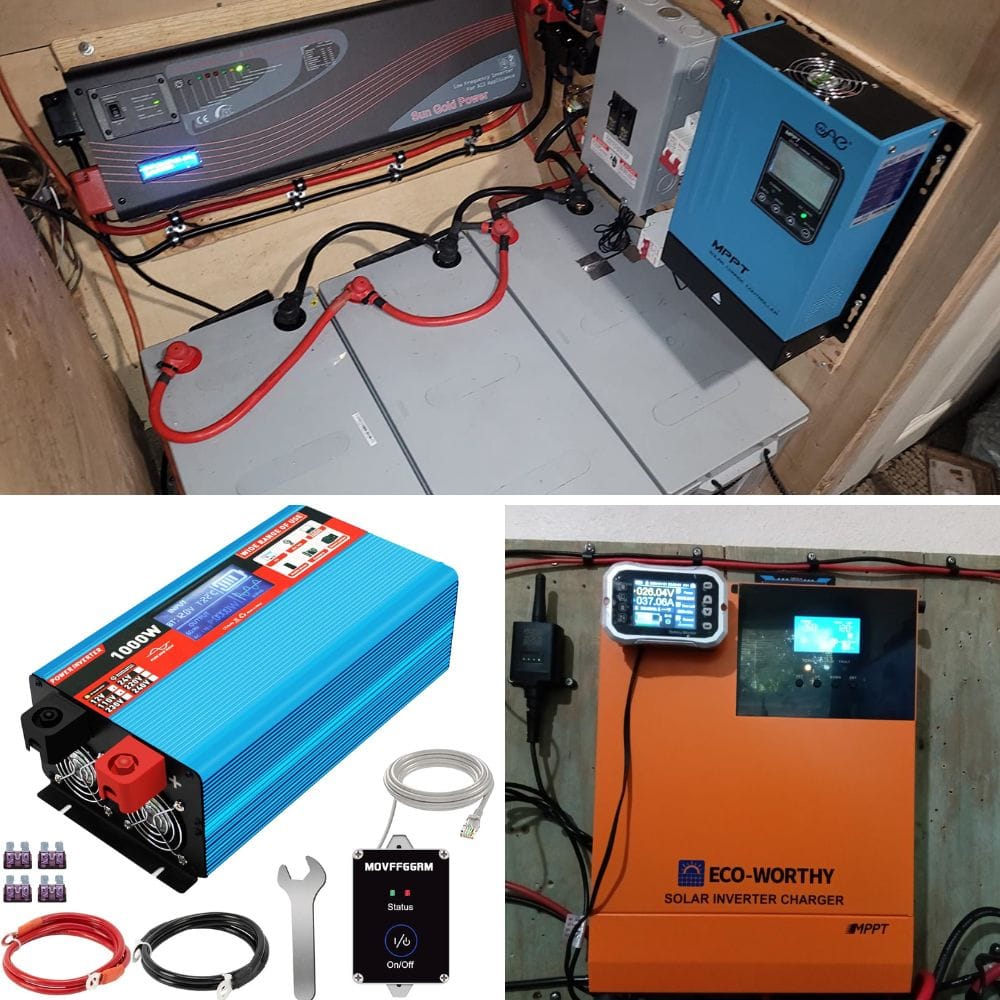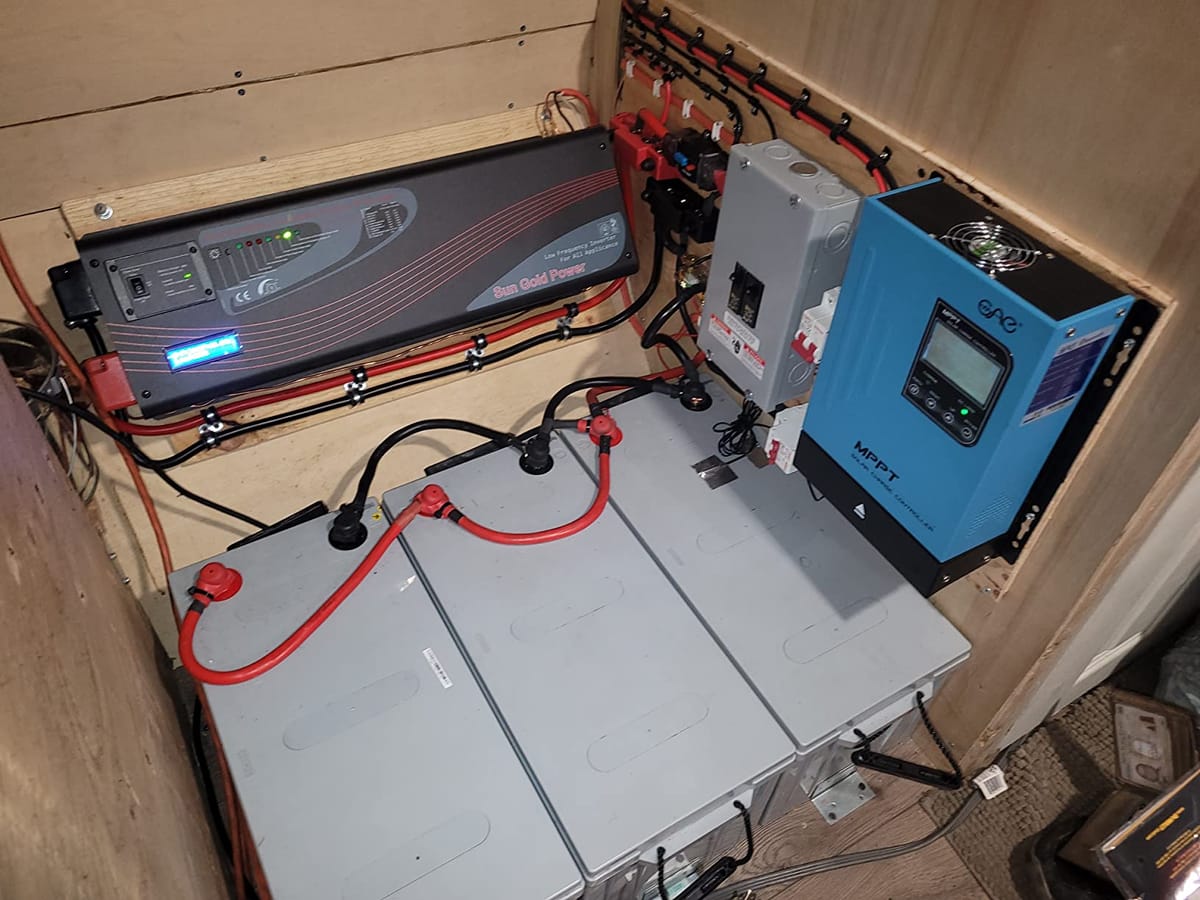Key Takeaways:
- Hybrid inverters can function without batteries, but their efficiency and benefits are maximized with battery storage.
- Understanding the differences between hybrid inverters and other types of inverters is crucial for optimal solar power system design.
- Hybrid inverters offer flexibility and reliability, making them a popular choice for modern solar installations.
Introduction to Hybrid Inverters

Hybrid inverters are a cornerstone of modern solar power systems, blending the functionality of a grid-tie inverter with the ability to manage battery storage. They are designed to manage energy from solar panels, batteries, and the electricity grid, providing a seamless power supply. However, a common question arises: Can a hybrid or solar inverter work without batteries? This article delves into the intricacies of hybrid inverters, exploring their capabilities, benefits, and limitations when operating without battery storage.
Understanding Hybrid Inverters
Hybrid inverters, or multi-mode inverters, are versatile devices that can convert DC power from solar panels into AC power for household use. They can also manage battery energy storage and supply power to the grid. This dual functionality makes them an attractive option for those looking to maximize their solar energy usage.
Without batteries, hybrid inverters can still function effectively by directly converting solar energy into usable AC power. However, the absence of batteries means that any excess energy produced during peak sunlight hours cannot be stored for later use. This can lead to inefficiencies and potential energy wastage.
How Hybrid Inverters Work
Hybrid inverters operate by converting the DC power generated by solar panels into AC power, which is compatible with household appliances and the electricity grid. They also can manage battery storage, allowing for energy to be stored and used during periods of low solar panel output or power outages.
When batteries are not present, hybrid inverters can still supply power directly from the solar panels to the household or the grid. This setup is similar to a grid-tied inverter system, where the primary goal of a grid inverter is to use solar energy as it is produced and send any excess energy back to the grid.
Benefits of Using Hybrid Inverters Without Batteries
One of the main advantages of using hybrid inverters without batteries is the reduction in initial installation costs. Batteries can be expensive, and by omitting them, homeowners can save a significant amount of money. Additionally, hybrid inverters without batteries require fewer components, simplifying the installation process.
Another benefit of battery inverters is the ability to still utilize solar energy and reduce electricity bills. Even without batteries, hybrid inverters can convert solar power into usable electricity, decreasing reliance on grid energy and lowering overall energy consumption.
Limitations of Hybrid Inverters Without Batteries
Despite their benefits, hybrid inverters without batteries have some limitations. The most significant drawback is the inability to store excess energy. Without batteries, any surplus energy produced during the day is sent back to the grid, which may not always be financially advantageous depending on local feed-in tariffs.
Additionally, hybrid inverters without batteries cannot provide backup power during outages. Batteries are essential for storing energy that can be used when the grid is down, ensuring an uninterrupted power supply. Without this capability, households remain vulnerable to power outages.
Comparing Hybrid Inverters to Other Inverter Types
Hybrid inverters differ from other types of inverters, such as grid-tied and off-grid inverters. Grid-tied inverters are designed to work exclusively with the electricity grid, converting solar energy into AC power and sending excess energy as battery power back to the grid. They cannot manage battery storage.
Off-grid inverters, on the other hand, are designed for systems that are not connected to the grid. They rely entirely on battery storage to supply power, making them suitable for remote locations. Hybrid inverters offer a middle ground, providing the flexibility to work with both the grid and battery storage.
Practical Applications of Hybrid Inverters Without Batteries
In scenarios where battery storage is not feasible or necessary, hybrid inverters can still be highly effective. For example, in regions with reliable grid power and favorable feed-in tariffs, homeowners can benefit from using hybrid inverters to maximize their solar energy usage and reduce electricity bills.
Additionally, hybrid inverters without batteries can be a good option for those who plan to add battery storage in the future. This allows for a phased approach to solar installation, spreading out the costs and making the transition to renewable energy more manageable.
Integration with Smart Home Systems

The integration of hybrid solar inverters with smart home systems is revolutionizing energy management. These inverters can connect solar panels to smart home devices, allowing homeowners to monitor and control energy usage in real time. By using an interactive solar inverter, users can optimize their power output and reduce reliance on the power grid. This integration not only enhances convenience but also contributes to a more environmentally friendly lifestyle by maximizing the efficiency of solar energy systems.
Moreover, smart home systems paired with hybrid solar inverters can automatically adjust energy consumption based on the availability of solar power. For instance, during peak sunlight hours, the system can prioritize running high-energy appliances, thereby without power outage reducing the need for battery backup or grid electricity. This synergy between smart technology and solar hybrid inverters ensures a seamless and efficient energy management solution, making it a very economical way to produce and store power.

Maintenance and Longevity of Hybrid Inverters
Maintaining hybrid solar inverters is crucial for ensuring their longevity and optimal performance. Regular inspections and cleaning of the inverter and solar panels can prevent dust and debris from affecting the system's efficiency. Additionally, monitoring the hybrid solar inverter work's performance through its built-in diagnostics can help identify potential issues before they escalate, ensuring a consistent power output and reliable operation.
Hybrid solar inverters are designed to be durable, but their lifespan can be significantly extended with proper care. Ensuring that the inverter is installed in a cool, shaded area can prevent overheating, which is a common cause of inverter failure. Furthermore, keeping an eye on the battery system, if used, and ensuring it is in good condition can prevent unexpected power outages and maintain a steady supply of electricity. Regular maintenance not only prolongs the life of the hybrid solar inverter but also ensures that the solar system continues to produce electricity efficiently.
Case Study: Hybrid Inverter Installation Without Batteries
Consider a homeowner in a suburban area with a reliable electricity grid and favorable feed-in tariffs. They decide to install a solar power system with a hybrid inverter but opt to forgo battery storage initially to reduce costs. The hybrid inverter converts the DC power from the solar panels into AC power for household use and any excess energy is sent back to the grid.
Over time, the homeowner notices a significant reduction in their electricity bills, thanks to the solar energy produced. They also appreciate the flexibility of their system, knowing they can add battery storage in the future if their energy needs change or if they want to ensure backup power during outages.
The Role of Batteries in Hybrid Inverter Systems
Batteries play a crucial role in hybrid inverter systems by storing excess energy produced during peak sunlight hours. This stored energy can be used during periods of low solar output such as at night or during cloudy days, ensuring a continuous power supply.
In addition to providing backup power during outages, batteries enable load shifting, allowing homeowners to use stored energy during peak demand times when electricity rates are higher. This can lead to further cost savings and increased energy independence.
Future Trends in Hybrid Inverter Technology
As technology advances, hybrid inverters are becoming more efficient and versatile. Innovations in battery storage, such as improved battery chemistry and longer lifespans, are making hybrid battery inverter systems more attractive and cost-effective.
Additionally, advancements in smart grid connection technology and energy management systems are enhancing the capabilities of hybrid inverters. These systems can optimize energy production and consumption, further increasing the benefits of using hybrid inverters with or without batteries.
Environmental Impact of Hybrid Inverters
Hybrid inverters contribute to a more sustainable and environmentally friendly energy system by maximizing the use of solar power. Even without batteries, hybrid inverters help reduce reliance on fossil fuels and decrease greenhouse gas emissions.
By enabling the integration of renewable energy sources into the electricity grid, hybrid inverters play a vital role in the transition to a cleaner and more sustainable energy future. Their flexibility and efficiency make them a key component of modern solar power systems.


Can a hybrid inverter work without batteries?
Yes, a solar hybrid inverter can work without batteries. It can convert DC power from solar panels into AC power for household use and send any excess energy back to the grid. However, without batteries, the system cannot store excess energy or provide backup power during outages.
What are the benefits of using a hybrid inverter without batteries?
Using a hybrid solar inverter without the batteries can reduce initial installation costs and simplify the installation process. It allows homeowners to utilize solar energy and reduce electricity bills by converting solar power into usable electricity. However, it does not provide energy storage or backup power during outages.
Can I add batteries to my hybrid inverter system later?
Yes, one of the advantages of hybrid inverters is their flexibility. Homeowners can start with a hybrid inverter system without batteries and add battery storage later as their energy needs change or as they seek to enhance their system's capabilities. This phased approach can make the transition to renewable energy more manageable and cost-effective.

Hybrid inverters offer a versatile and efficient solution for managing solar energy, whether or not batteries are included in the system. While the absence of batteries direct solar inverter may limit some of the benefits, such as energy storage and backup power, hybrid inverters can still provide significant advantages in terms of cost savings and energy efficiency.
For those considering installing solar power and interactive inverter systems, understanding the capabilities and limitations of hybrid inverters is essential. By carefully evaluating their energy needs and local grid conditions, homeowners can make informed decisions about whether to include battery storage in their solar hybrid inverter systems.









